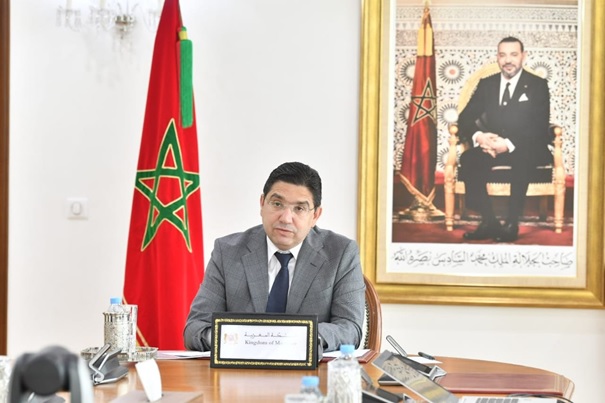
Morocco, which maintains distinguished relations with Japan, is willing to use all available means to help promote the Arab-Japanese political dialogue and raise it to a level of genuine cooperation, Foreign Minister Mr. Nasser Bourita said on Thursday, April 1st, 2021.
Mr. Bourita, who was speaking via video conference at the second session of the Ministerial Meeting of the Arab-Japanese Political Dialogue, noted that this cooperation must be based on a clear vision and realistic action plans to strengthen mutual interests and achieve common benefits.
This meeting rightly propels the process of this dialogue to higher levels and moves from consultation to launching concrete initiatives and programmes “in harmony with our common quest to achieve sustainable development for the benefit of our peoples and our region, in a win-win logic,” he said.
The Arab-Japanese cooperation, on the economic and political levels, is one of the most important forums for dialogue between Arab countries and other friendly countries, aiming at consolidating the foundations of consultation and cooperation to achieve common interest and mutual benefit, Mr. Bourita said.
He also stressed that this cooperation has become an imperative necessity in order to face challenges, such as those imposed by the Covid-19 pandemic, which have tested the cohesion of the international community and shown that there is no way out of global crises except through intensified efforts and exchange of new expertise and information without favoritism or monopolization of solutions.
In this regard, the Minister praised the spirit of solidarity that Japan has expressed towards Arab countries in the fight against the new coronavirus, as well as the aid granted by the Japanese government to overcome this ordeal and mitigate its repercussions, specifying that Morocco, as an example, has benefited from support in the form of a loan of 200 million dollars on preferential terms, in addition to various subsidies to cope with the social and economic impacts of the pandemic.
On the other hand, Mr. Bourita said that the item “Maritime security, international law and energy security”, which is part of the agenda of this meeting reflects, without any doubt, the importance of this issue for both Arab and Japanese parties, for two reasons, firstly the Arab region represents a factor of balance and stability for energy supplies in the world and secondly the Japanese partner imports about 90pc of its energy needs from the countries in the region.
“Based on the logic of mutual interest, we are called upon today to adopt a common approach encompassing an international effort that goes beyond traditional institutional boundaries, to ensure the respect of security and stability of maritime passages in the Arab region, in a way that contributes to the fluidity of traffic,” he insisted.
In this regard, he stressed that Morocco, located at the most important crossroads in the world (the Strait of Gibraltar sees the passage of more than 300 commercial ships and 500,000 tons of fuel every day), and which conducts 95% of its international trade via maritime navigation, is aware of the vital importance of this activity as a fundamental lever for development and calls for ensuring the safety, security and sustainability of maritime traffic.
“The Kingdom also stresses the need to respect international law and the rules of maritime navigation, which should not be subject to any constraint or interference,” he added.
As for Moroccan-Japanese relations, Mr. Bourita said they represent a model of fruitful and sustainable interaction, whose success has not been hampered by geographical distance or cultural difference.
One illustration of this interaction, he added, is the choice of 75 Japanese companies to invest in Morocco, in addition to the economic and social projects carried out by the Japan International Cooperation Agency (JICA) in various regions of the Kingdom.
It is also the holding of the “5th Morocco-Japan Joint Commission” in January 2020 which contributed to enrich the legal framework of bilateral relations through the conclusion of two new agreements concerning the encouragement and protection of investments and the abolition of double taxation, he noted.
The Minister also stressed that Morocco, under the wise leadership of His Majesty King Mohammed VI, is determined to promote its relations with Japan to cover broader areas, to work together to consolidate the rules of international cooperation based on respect for the sovereignty of States, their territorial integrity and their national constants, and to contribute to the support of the excellent relations between Arab countries and Japan.
It is also a question of strengthening the partnership and cooperation relations between Japan and African countries, especially within the framework of the “Tokyo International Conference on African Development”, on which the Kingdom relies as a platform to implement economic and social development projects that serve the interests of the continent, and not to hamper them with sterile political submissions, he continued.
In the same context, Mr. Bourita emphasized Japan’s distinguished position on the international scene and its active role on the world stage, whether at the political, economic, cultural or technological level, which makes it a reliable partner and a distinguished interlocutor in the defence of just Arab issues, notably the Palestinian cause.
In this perspective, the Minister added, Morocco, under the leadership of His Majesty King Mohammed VI, Chairman of the Al-Quds Committee, will continue to support the peace process as a strategic option to resolve the Israeli-Palestinian conflict, and achieving a permanent and comprehensive solution that allows the Palestinian people to restore their legitimate rights and establish their independent, viable and sovereign State, with East Al-Quds as its capital, coexisting with the State of Israel, with the need not to prejudice the religious pluralism of the city of Al-Quds and to preserve its legal status.
“Although the Palestinian cause is at the forefront of our concerns, we do not forget the other Arab crises, notably in Syria and Yemen, in which we seek to reach urgent political solutions and agreements, in accordance with the relevant UN and international decisions, capable of breaking the deadlock,” Mr. Bourita concluded.
